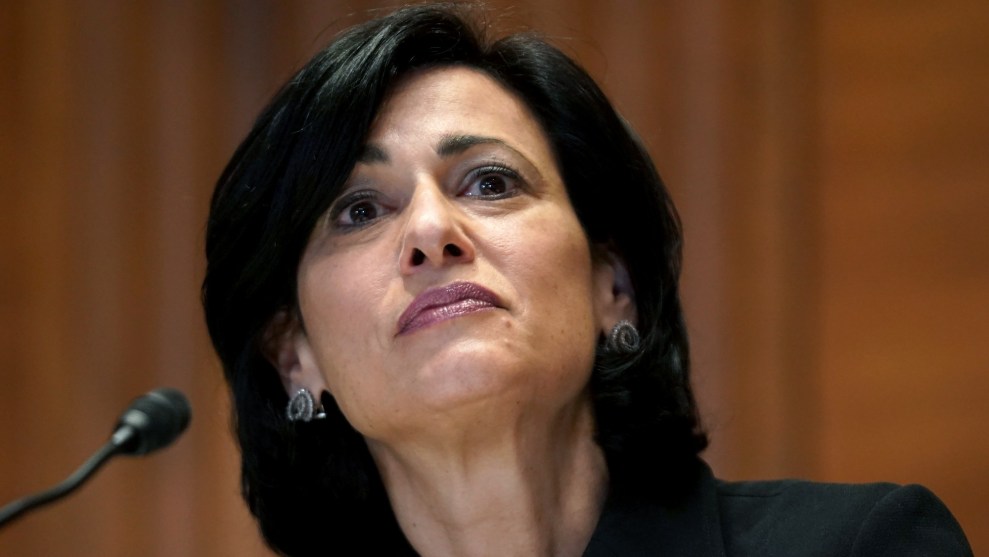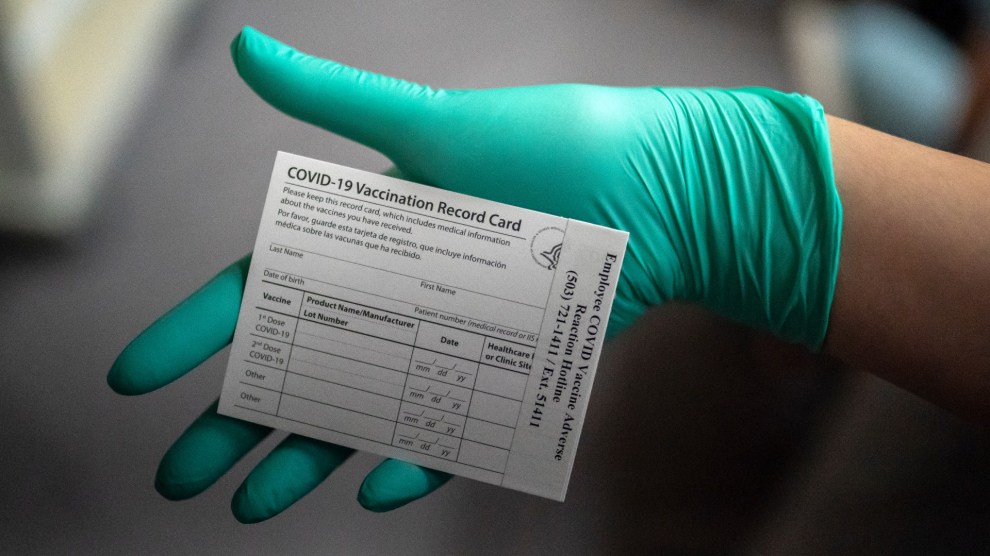
Abdullah Kilinc/Getty
The pandemic hit home for Alan Christianson, a board-certified endocrinologist and naturopathic medicine practitioner based in Phoenix, a few weeks ago when he learned that one of his practice’s patients had died from COVID-19. She was in her 70s and unvaccinated. “Everyone at the clinic loved her,” Christianson told me. “She was always well dressed and articulate and always eager to hear about the affairs of everyone’s lives and whose kids are doing what and just is such a joy to be around.”
Even though Christianson wasn’t treating Sandra (a pseudonym) personally, he knew she paid attention to his work, and her death convinced him that he and his colleagues needed to do better in communicating the facts about vaccines. “I really took it as a personal failure for not doing a good enough job educating people about this. People are dying unnecessarily. The vaccines work and those who are hospitalized and dying, they don’t have to be anymore, and it’s just a tragedy,” he says. “I don’t even see them as dying from the virus. I see them as dying from disinformation.”
Christianson is pro-vaccine himself, but as a naturopath—a practitioner of alternative approaches to health, treatment, and prevention—he interacts regularly with patients and colleagues who are ambivalent, skeptical, and often outright opposed to vaccines, including COVID-19 vaccines. As a member of NDds for Vaccines, a group of naturopathic practitioners calling for evidence-based discussion, Christianson co-authored a post titled, “The Covid Choice,” a pro-vaccine primer tailored especially for skeptics. I asked Christianson to share his thoughts on the complexities of vaccine hesitancy amid a deadly pandemic. These are his words, edited lightly for length and clarity.
On why a group like NDs for Vaccines is needed.
People who would not just go along with whatever conventional guidelines are in place, they think about looking for what the naturopathic doctors are saying. And there are those in our profession, they’re certainly a vocal group, that are not in favor of vaccines. Our profession is young—we’re maturing and forming more and more collaborations with the conventional world, and also more collaborations with third-party reimbursement licensure throughout the States. In many cases, the policies or the views of some [NDs] about vaccinations has been a barrier to our growth and our progress. So many of us are wanting to say, “Hey, look, some people feel that way, but they do not speak for the profession.” So the statements of our professional organization, the American Association of Naturopathic Physicians has taken these views into account and become more nuanced about it.
On facts vs misinformation.
Data, statistics, facts—these things become so muddled nowadays, and there’s not really agreement. The term is epistemology, how we know what we know. And I think that’s where the real problem lies. Everyone thinks that they are operating off of facts. But some are based upon conjecture and some are based upon real world outcomes. And when we see facts conflict, I would argue that the best approach is to then weigh the merits of their evidence.
There’s so many ways in which data can be misleading, confusing, weaponized—and it’s easy to take that and just become nihilistic and say, “Well, everything’s all made up. None of it matters. We can’t trust anything.” And that’s not helpful either. It does take an acknowledgement that science is a process. It’s not truth; it’s not perfection. It’s a system and it’s the best way to find answers given the data we have right now. If we look at objective data on real world clinical outcomes, the comparison between the harm of the vaccine and the harm of the virus are not even in the same ballpark. All the worst fears people have about the vaccine—even if you take them at face value, even if you don’t really go through and check their merits—those things still end up being orders of magnitude milder than the fallout from COVID. So to me it seems like the choice is quite obvious: Unless you’re planning on being in a cave for the next decade, people are going to have to make a choice: get the vaccine or get COVID.
On people’s fears of long-term effects from the vaccine.
We’ve got to compare [the relative risks]. We’ve got strong data about COVID long haul syndromes. One big study showed that a group of young men on a football team that had COVID—six months later a large percentage had signs of cardiac damage. Or we had the cruise ship where people were infected, and many of those that got COVID were asymptomatic, but roughly 20 percent had signs of pulmonary damage six months down the road. So we know that there’s long-term harm. We have no good data arguing that there’s harm emergent from the vaccines. With vaccines in general there have been tons of problems, and many vaccines have been pulled from the market for known complications. To date, all those complications have taken place within a window of a couple months. We’ve had vaccines now for decades and decades and pretty good tracking. And there haven’t been examples of vaccines that do bad things unexpectedly years down the road.
On how COVID-19 isn’t comparable to the measles.
Another big mindset is just about a vaccine vs. the actual infection. You may or may not get measles and someone can think they can put the odds of them not being exposed into the equation of whether or not to vaccinate. And that may not be unreasonable. But this is a case where we really don’t have that luxury. It is almost inevitable to get this. And the vaccine is something where it’s a lesser insult than the actual infection by some degree.
On the vaccine hesitancy of some naturopathic practitioners.
The funny thing is, if you go back historically, in my profession, we started using the term naturopathic in the early 1900s, late 1800s. And this was around some of the early days of vaccination. And the majority of early doctors thought this was completely naturopathic. This was using nature, the body’s own immune system; it was using elements of the infection to overcome it. So there’s nothing really core or baked into our philosophy that goes against vaccines. But I do think that there is a strong tendency in natural medicine to be somewhat reactionary and somewhat contrarian. A practitioner can gain traction by just taking views that are different from mainstream views, sometimes just for the sake of it. There’s certainly been a contingent who have been contrarian and gone against the conventional approaches, even when they’re good. There is a valid role for having some questioning to any approach science thrives on. But a lot of things that are working in conventional medicine are good, and they should be recognized as such and embraced as such. And there are times where natural medicine fails to do that.
On dealing with anti-vax colleagues.
There’s a group that I won’t name, a large group of doctors that are not in my exact profession, but natural medicine in general. And they’re having a gathering in October, and it’s often hundreds of people. And there’s very strong anti-vaccine sentiment. A friend of mine, who’s also in that group—we were texting back and forth saying, ‘Hey, are you going to go? I think it might be a super spreader event.’ It’s like all these people that are not vaccinated in a closed room.” To be candid, I struggle with this, I do. And there are many that feel as I do, but there’s a very vocal minority that can often dominate the conversation.
On persuading people that getting vaccinated is the safest choice.
I’ve seen data arguing that there’s some contingent of people, somewhere around 14 percent of the population, that probably never will get vaccinated, and they’re just probably not reachable. And then there’s those who are just going to do it and not even question it. And there’s those who are sorting it out. And the sorting has been dwindling. In my interactions with patients, pretty large numbers of people reach out and just thank me for giving information. As a naturopathic doctor, I think I actually have more leverage for some of those persuadable people than a conventional doctor might, because some might quickly dismiss things from a conventional doctors like “Oh, you know, they’re shills for Big Pharma, or they’re just saying what the CDC tells them to say,” or whatever. But yeah, when someone says no to the vaccine, I get these concerns and I respect them. And I can say “But here’s why I still think this is the way to go.”
On the importance of creating a dialogue.
I think [pro-vaccine arguments are] much more apt to be effective in the context of a dialogue than in the context of mass outreach. In general, if you can have a conversation with someone and can talk through their concerns or their objections, not from a place of just blanket dismissal but from a place of understanding and say, “Oh, yeah, I understand why you’re worried about long-term harm from the vaccine. And here’s some thoughts about that.” If I can walk through several concerns in really good detail, there’s a point at which people realize, “Oh, hey, this person is aware of these things that I’m aware of.” I can then earn trust in which future points don’t require that same level of depth. They’re happy to say, “Okay, if that’s what you suggest, I’m good with that.” But it does take really hearing them respectfully and talking through their concerns and giving them merit. The drawback about that is that it does require someone to be quite versed in what the concerns are. You’ve got to be able to talk about those things intelligently.
On the humanity of anti-vaxxers.
Well-intended, intelligent people can come to diametrically different conclusions. They’re not crazy, you know, they can be intelligent, they can be educated, they can be sincere, they can want the best outcomes for those around them. And by and large, I take those things at face value. But ultimately we don’t choose the data that we’re exposed to. And we don’t choose how we respond to the data. People can start out with small differences. But with psychological effects like confirmation bias, once we get a small amount of acceptance toward an idea, we start seeing all future data differently. And if that data conflicts with our ideas and our beliefs, we hold the lens of scrutiny to it. And if there’s data that supports our belief, there is a lower bar. Once that process starts, it happens very quickly, and it’s subconscious.
On healthy skepticism vs cynicism.
Skepticism is kind of like paint: It’s only good if you apply it evenly. People often conflate cynicism with skepticism. Skepticism is, “I’ll wait till I see good evidence either way.” Cynicism is “I don’t believe the evidence.” Cynicism is a psychological state, and it’s not a state that one enters through reason or facts. So you cannot really take someone out of that through reason or facts. When people will not be willing to engage whenever any kind of data contradicts their worldview, that’s no longer healthy skepticism. That’s just cynicism.














